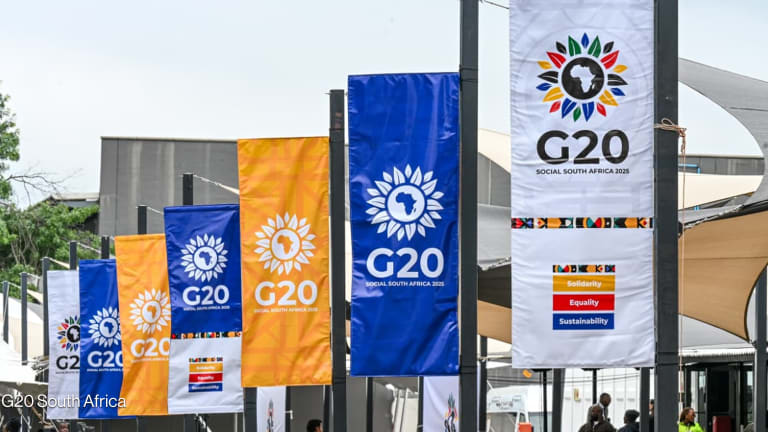
LONDON — More than 800 delegates representing government, civil society and the development community are convening today for the first Global Disability Summit, hosted by the British and Kenyan governments and the International Disability Alliance with the goal of generating new commitments toward implementing the United Nations Convention on the Rights of Persons with Disabilities.
Discussions will span four themes: Addressing stigma; supporting inclusive education; economic empowerment; and technology and providing better access to devices. Monday’s presummit Civil Society Forum kicked off the debate with tough questions about chronically underfunded local and regional disabled persons organizations; the need to include these DPOs in policy discussions; and the special challenge of reaching disabled people in humanitarian crises, particularly children who are often the most marginalized.
But to address these concerns, we first need more information, according to Ana Lucia Arellano, chair of the board of IDA, and president of the Latin American Network of Non-Governmental Organizations of Persons with Disabilities and their Families.
“One of the most challenging barriers to our advocacy is around data, setting this starting line for counting people with disabilities to really demonstrate to governments whether rights are being achieved, in education, in health care services, in everything,” Arellano told Devex. “So this is our major issue right now, and then we move forward to focusing on disability inclusion in education.”
The U.N. CRPD was adopted by more than 200 signatories in 2006, but 12 years later, IDA and others have lamented slow progress toward implementing the convention at the national level.
“I think what happened is that funding did not [become] available to empower people with disabilities,” Arellano said. “I think things have been evolving so fast, that we were advocating a rights vision, and now we have to move to thinking of inclusive development.”
Arellano added that IDA and other DPOs learned that “giving our national DPOs the chance to advocate at the global level, we could bring a very strong voice out there, but now we are very keen to go there at the national and local level to really understand, what are their priorities? We cannot impose any global model, we have to create whatever we need there.”
Though today’s summit is not billed as a pledging conference, large-scale commitments are expected from the United Kingdom Department for International Development, the World Bank and U.N. agencies, Devex has learned.
The U.K. government, IDA, and the World Bank have already kicked off commitments with a number of new initiatives. “AT Scale” is a DFID-led pledge which aims to reach 500 million people globally by 2030 with affordable devices and basic technology, including wheelchairs, prosthetics, hearing aids, and glasses.
DFID also announced a new disability-focused program through UK Aid Connect — the main DFID funding stream — which will work with organizations in small communities in lower-income countries to support disabled people to obtain jobs.
And DFID and IDA will collaborate on an online platform where summit commitments will be recorded and tracked over the coming months and years, to be hosted on the IDA website, Gerard Howe, head of the Inclusive Societies Department at DFID, said during comments at the Civil Society Forum.
Howe explained that DFID will use the next year not only to track progress on commitments made at the summit, but also to “generate a longer-term mechanism by which people can share data on the way in which commitments made under the CRPD and elsewhere have been realized, and are being tested and challenged,” he said.
“So we set up two things: A small stakeholder group with key partners looking at how we can move those forward. But secondly, we would like to open up a partnership forum and would invite everyone in this room to join us. We want to hear your views on how we can build a complimentary accountability mechanism that goes alongside the CRPD, that goes alongside the national reporting and conference of state parties, but covers not just states, covers all of us, because we all have a responsibility in this process.”
IDA will also announce a new set of guiding principles for disability inclusion in humanitarian contexts, and the World Bank on Monday launched the Disability Inclusion and Accountability Framework — “the first time ever that the World Bank has its thinking and the narrative behind disability inclusion in one document,” Charlotte McClain-Nhlapo, global disability adviser in the social, urban, rural, and resilience global practice at the World Bank, said.
The strategy seeks to “provide a new road map on disability inclusion for World Bank staff,” she said. “In our sense, it’s about building capacity in World Bank staff, so that we can better inform our clients about how to design for persons with disabilities and how to make sure that our projects are more inclusive.”
Still, heading into the summit, Tom Dannet, chief executive officer and founder of Street Child UK, told Devex, on Monday, that something has so far been missing from discussions. “I think what I feel has been missing so far, and I hope there’s more of over the next one and a half days, is a focus on the most, most marginalized in the poorest parts of the poorest countries,” Dannet told Devex.
“I’ve had a lot of conversations today about mainstreaming and government priorities, but how do we ensure that those living beyond the spaces where government provides [services] don’t have to wait?”
Devex is on the ground at the Global Disability Summit in London today, July 24. Follow U.K. correspondent @mollyanders_dev on Twitter for updates throughout the day, and keep an eye out for more stories to follow on Devex.com.








